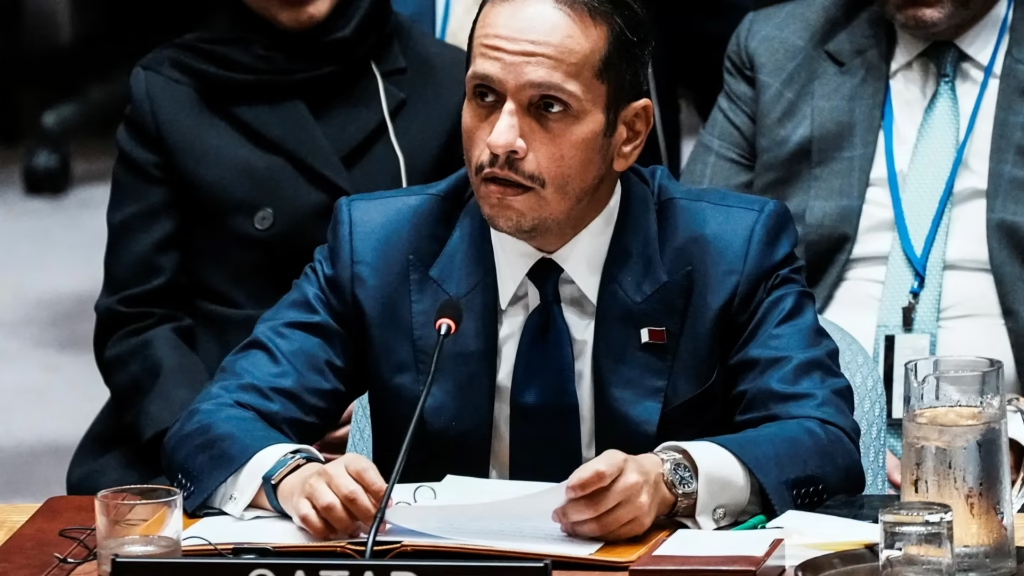
In an unprecedented show of unity, the United Nations Security Council (UNSC) condemned Israel over its deadly airstrike on a Hamas leadership compound in Doha, Qatar. The strike, which resulted in the deaths of at least six Hamas officials, marks one of the most serious escalations in the Middle East this year, further destabilizing the fragile peace process.
The Deadly Airstrike in Doha
On September 9, 2025, Israeli forces carried out an airstrike on a prominent Hamas political compound in the Qatari capital. The attack targeted top Hamas leaders who were reportedly involved in high-level negotiations regarding a ceasefire and the release of hostages from Gaza. Witnesses described scenes of devastation as rescue teams worked frantically to extract survivors from the rubble.
Qatar’s Prime Minister, Sheikh Mohammed bin Abdulrahman Al Thani, immediately condemned the attack, calling it a “blatant violation of Qatari sovereignty” and “an attempt to sabotage peace efforts.” He stressed that the strike not only targeted Hamas leaders but severely endangered the ongoing negotiations aimed at stabilizing Gaza and ensuring the safe release of hostages.
“The timing could not be worse,” Sheikh Al Thani said during an emergency session of the UN General Assembly. “This attack strikes at the heart of diplomacy, disregarding human life and the fragile hope for peace.”
UN Security Council’s Strong Reproach
On September 11, 2025, the UN Security Council held an emergency session to address the situation. All 15 member states—including the United States, United Kingdom, China, Russia, and France—joined in issuing a firm statement condemning the Israeli airstrike.
Although the statement carefully avoided explicitly naming Israel, it emphasized that such unilateral military actions were unacceptable and in clear violation of international law. The joint declaration called for immediate de-escalation, full respect for Qatar’s sovereignty, and the protection of civilians.
UN Secretary-General António Guterres echoed these sentiments, calling the airstrike a “dangerous violation of international law” and urging both Israel and Hamas to “cease hostilities and recommit to peaceful negotiations.” He warned that further escalation could spiral into a larger regional conflict, destabilizing the entire Middle East.
“This moment calls for responsible leadership and the urgent return to dialogue,” Guterres said. “Violence will not bring peace. Only diplomacy can.”
International Backlash and Support
The Israeli airstrike provoked widespread condemnation from across the globe. Countries like Algeria and Egypt denounced the action as “brutal aggression” and a “violation of international norms.” Iran also strongly condemned the strike, calling it a calculated attempt to disrupt peace efforts and escalate the crisis.
European nations, including France and Germany, criticized the airstrike as “unacceptable” and urged Israel to reverse course. In a rare diplomatic moment, the United States—traditionally Israel’s strongest ally—joined the UN’s condemnation. U.S. officials emphasized that the strike was “counterproductive” and called for restraint and a renewed commitment to negotiations.
Meanwhile, Hamas reacted defiantly, insisting that the attack would not alter their demands for a ceasefire. Hamas official Fawzi Barhoum accused the U.S. of complicity, labeling the airstrike as “an assassination of the entire negotiation process” and “a deliberate attempt to sabotage peace.”
Impact on Peace Negotiations
At the time of the airstrike, Qatar was mediating high-stakes negotiations aimed at securing a long-term ceasefire between Hamas and Israel, as well as the release of Palestinian hostages held in Gaza. The attack significantly undermined the trust necessary for diplomacy, with Hamas threatening to withdraw from talks altogether.
Despite the attack, Qatar remains committed to its role as a mediator. Sheikh Al Thani confirmed that Qatar would continue pressing for peace and pledged to host an upcoming Arab-Islamic summit focused on resolving the crisis. The international community, particularly the UN and several European governments, reiterated their support for Qatar’s diplomatic efforts.
However, analysts warn that the strike dramatically reduces the chances of any short-term peace agreement. “It’s a political blow to the entire negotiation process,” said Dr. Amal Khalil, a Middle East expert at the University of Oxford. “Trust has been shattered, and with such a direct violation of Qatari sovereignty, we are unlikely to see progress unless all parties backtrack.”
Financial and Geopolitical Ramifications
The attack not only risks prolonging the conflict in Gaza but also has significant financial and geopolitical implications. Qatar’s leadership has already promised to invest in humanitarian aid and reconstruction in Gaza, while simultaneously stepping up diplomatic efforts to isolate Israel internationally.
Meanwhile, Israel’s decision to strike inside a Gulf state signals a new and dangerous escalation, raising fears of further regional instability. With tensions rising, several Arab nations have warned that such actions could backfire, leading to broader regional conflict.
Conclusion: A Critical Turning Point
The UN Security Council’s condemnation of the Israeli strike on Qatar represents a critical moment in international diplomacy. With global powers urging restraint and diplomacy, the airstrike underscores the fragile state of peace in the Middle East. The coming weeks will be pivotal in determining whether diplomacy can be salvaged or if violence will once again dominate the region’s future.



